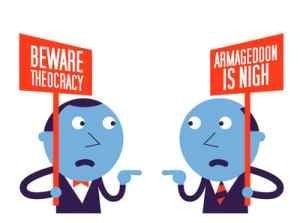Friday: Further Thought – The Prophetic Calling of Jeremiah
Martin Luther wrote about the prophet in the introduction of his commentary to the book of Jeremiah: Jeremiah was a sad prophet, who lived in a deplorable and difficult period and, what is more, his prophetic service was extremely difficult as he was struggling and fighting with a bad-tempered and stubborn people.
Apparently he did not achieve much success because he experienced how his enemies became more and more evil. They tried to kill the prophet several times. They pressed hard against him, whipping him several times. Yet, he would live to see with his own eyes how his country was devastated and his people taken into exile.
For forty years Jeremiah was to stand before the nation as a witness for truth and righteousness. In a time of unparalleled apostasy he was to exemplify in life and character the worship of the only true God. During the terrible sieges of Jerusalem he was to be the mouthpiece of Jehovah. He was to predict the downfall of the house of David and the destruction of the beautiful temple built by Solomon. And when imprisoned because of his fearless utterances, he was still to speak plainly against sin in high places. Despised, hated, rejected of men, he was finally to witness the literal fulfillment of his own prophecies of impending doom, and share in the sorrow and woe that should follow the destruction of the fated city.
-Ellen G. White, Prophets and Kings, p. 408.
Discussion Question:
- One of the saddest things, and yet something that should give us all, today, as Seventh-day Adventists, something to think about, is the fact that God had warned Jeremiah that he would face great opposition from his own people. Read Jeremiah 1:17-19 again. Who would be the ones fighting against him? What fearful lesson should we take away from this for ourselves? That is, what is our attitude toward the prophetic word to us, especially when we hear things that we don’t like? How does the Ellen G. White quote above help express the fearful truth that the very ones who should have been revealing the true God to the world were the ones who were, by reviling and attacking His spokesman, fighting against Him? (See also Eccles. 1:9.)


Jehovah told Jeremiah that ‘the church’ would reject his message. Today how can we judge if a message is from Jehovah? Is acceptance or rejection by ‘the church’ a proof?
The church is supposed to reject error. This is God ordained. So acceptance or rejection by the church isn’t alone proof that a message is from God. Many “loner prophets” have been rejected by the church because of their errors, as the church should reject it.
The problem comes when the church begins to see anything different from itself and the way things have always been done as error. We tend to keep falling into this trap of erecting religious monuments and as long as we maintain them, we feel safe, religious, righteous, holy. When God sends a message that conflicts with these monuments, we see it as error, instead of God trying to free us from our legalistic selves.
To prevent falling under the wrong message we need to read the scriptures for ourselves and ask the Lord to help us to understand his words. Whatever is preach to us we can know if this is correct by reading and looking it up for clarity.
Like Jerimiah we too have to tell others about the Lord and spread the gospel.
The best response. If its not according to scripture, reject it.
As Adventist,the worry is ,~we have chosen the wrong route in opposing his word as Jeremiah puts it….we need a revival from within us.
So true, each one within needs to daily be revived and renewed by the love and power of Jehovah, then as a result the body of Jesus will be revived as well.
To the law and to the testimony,if they speak not according to these,then there is no light in them.So only when the prophetic word lines up with the word of God there is truth in it.Opposition or no opposition.That’s the test of whether the prophet is true or not.
I believe the days prophesied by Jeremiah are here, some members of the church reject the spirit of prophesy and are accepting human theories that are not parallel to the world of God.
How do witness to people who don’t attend church?
That is the point of witnessing Holly. To be effective you must witness to people outside the church, and to do that you need to meet people where they are. I am retired and in my retirement have become active in community groups that are involved in nature and conservation. Most of the folk that I associate with in these groups know that I am a Seventh-day Adventists and further we share a common interest.
For example I went photographing birds with a couple just this last week. We are all passionate about birds but during the course of the day, health issues came into the discussion and I did not need to say much, they saw that I had less health issues than them and they wanted to know why I was a lot older than them and acted a lot younger. No doubt I will see these folk again even though they live in a different state.
Witnessing is a lot more than just quoting bible texts. When people see in us something they want in themselves they will ask how and why.